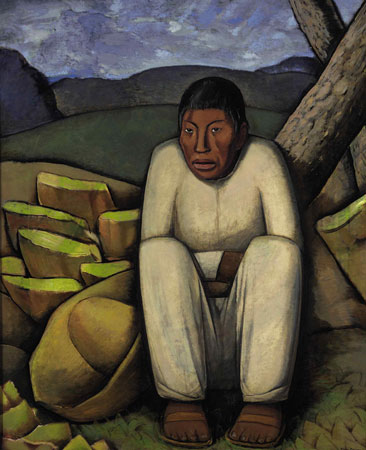
From Independence to the Revolution
conditions | commentary | the revolution | map | meaning | links | ethnic mixture | U.S. relations | conclusions
The Mexican Independence was won by a Revolutionary war against Spain that Octavio Paz explains how "it became the drama that was both tragic and creative."
p. 137
Amiguity | land reform | equality
"into a territory subject . . . to the center of power."
p. 117
"Independence offers us the same ambiguous image as the conquest."
p. 118.
"moments of flux and reflux in a great historical wave that gathered in the fifteenth century, flooded over America, attained a brief but splendid equilibrium in the sixteenth and seventeenth centuries, and finally receded after collapsing into a thousand fragments."
p. 118-119.
"The dualism is even more perceptible in the South American countries. The personalities of their leaders were less adulterated and their opposition to the Spanish tradition was more radical."
Miranda participated in the French Revolution and fought at Valmy. Bello lived London. Bolivar spent his apprentice years in the kind of atmosphere that produces heroes and princes, he was educated from early childhood to liberate and govern."
p. 119.
"Our own independence movement was less brilliant, less rich in ideas and phrases, more rigidly determined by local circumstances. Our leaders -- humble priests and obscure captains -- did not have a clear conception of what they were attempting to do. On the other hand, they had a greater sense of reality and were better able to hear the coded messages that the people were murmuring to them."
pp. 119-120.
Amiguity | land reform | equality
Octavio Paz in The Labyrinth of Solitude in 1950 explains that the Mexican Revolution was “A search for ourselves in this blood fiesta.” We searched for ourselves in a mortal embrace.
"The immediate antecedents of the movement are not difficult to find. First there was the political and social situation. The middle class had increased had increased due to the growth of commerce and industry, which used native personnel even though they were mostly foreign-owned."
p. 137.
"Our movement was distinguished by a lack of any previous ideological system and by a hunger for land. The Mexican peasants supported the Revolution not only to achieve better living conditions but also to recover the lands that had been taken from them during the colonial period and the nineteenth century by the royal land grants and the great haciendas and estates."
p. 141.
Paz' history sees the revolution as:
- unsuccessful
- hope for authenticity
- atomism to replace feudalism
- money to replace service
- positivism replaced romanticism
- technology replaced work
- industry transformed agriculture
- fuel transformed the concept of power
"The revolution was going to invent a Mexico that would be faithful to itself."
to secure our political independence and recover control of our natural resources
"we did not even own the oil, minerals, electric power and other resources
with which we had to transform the country.
"the state as the agent of social changes."
The state as an arbiter of culture
"Its first job was to recover and divide up the land,,
open other lands to cultivation, and establish irrigation projects, rural schools
and agrarian banks."
"The danger of a return to monopolization of the land still
exists. Our gains have to be defended constantly."
Our population increase -- is partially responsible for the
present imbalance . . . . The greater part of the country suffers from rural
over population."
"Our industrial growth would have been impossible without the nationalization of the oil industry."

20th century, reflections on the second Mexican Revolution of 1910
"The twentieth century has seen the birth of the party"
"We must learn to look reality in the face."
nationalism
agrarian reform
worker protection
industrial policy
"Along with the cult of the leader there is the official
party."
Like the Congress Party in India, the Mexican nationalist party
has far right to far left reform elements. PRI -- Progressive Revolutionary
Independence
"Everything seems to be one gigantic mistake."
Mexican revolution interpreted
Amiguity | land reform | equality
Labyrinth | Summary | Other Works | Authors | Site-map | home